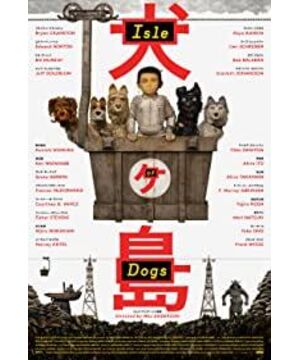"Isle of Dogs" is my most anticipated movie in April, pretty much the only movie I'm looking forward to.
After all, seeing Wes Anderson on the big screen is always a blessing.
Although the story in the second half is actually somewhat lacking in narrative, the much-anticipated healing style has still been well-received across the board:
The exquisite Japanese style, mixed with a strange apocalyptic feeling and a little steampunk flavor, is a "good" breakthrough.
Music is the part that I care about very much, and "Isle of Dogs" surprises me in this aspect, which makes me feel the charm of drum beats, those gloomy or light drum sounds, step by step, stepping on your heart.
Some people say that this film shows Wes Anderson's ambitions beyond the fresh: those Hiroshima, Mushroom Cloud, Yoko Ono... They saw metaphors, saw tributes, saw anti-war voices, and even the politics of "foreign forces" joke.
And I'm just happy because I saw "The Little Prince" again.
When the rickety little plane came down from the sky, I grasped the inextricable connection between them almost immediately:
Pilot, little boy, pursuit and domestication.
The Little Prince really means something to me:
When I got the first copy of The Little Prince, I was still a little girl. The original owner of the book was a beautiful older sister. Unlike the later editions, which were exquisitely bound and had the night sky and stars on the cover, the book was very thin. Very old, the cover is a snake swallowing an elephant;
The first perfume I remember is called "Midnight Flight";
My favorite Hong Kong drama, the last scene is the hero reading to the comatose heroine by the hospital bed: "When you fall in love with a flower on a planet, when you look up at the sky at night, the stars in the sky are full of as if blooming" ;
The tattoo in my dream is a fox and a rose, and the position is right behind the neck;
The last movie that reminded me of "The Little Prince" was "Adam" three years ago, and I really liked it at the time.
It's an ordinary movie that makes you realize yourself: a story where everyone thinks they're the little prince, only to find out that you're just a pilot, an alcoholic, and a lamplighter.
In contrast, "Isle of Dogs" is much more direct. He directly aims at the loneliness and fetters of the soul:
Proud Chief explains why he doesn't keep pets many times:
I bite, I don't know why.
And in our human world, it's nothing more than "preemptive rejection for fear of losing."
So when Chief said no, and finally brought the stick back for the first time, I was suddenly sad: freedom ended, connection appeared, bondage emerged.
The fox in "The Little Prince" has a monologue about "domestication" that fully explains the mentality of building this relationship:
"To me, you're just a little boy, just like thousands of other little boys. I don't need you, and you don't need me. To you, I'm just a fox, Not different from thousands of other foxes. But if you tame me, we will need each other. To me, you are unique in my world; I am to you, and yours The only one in the world."
I have been reluctant to like foxes since this sentence.
He had too unrealistic expectations for the little prince and "domestication".
Lonely people are willing to establish an intimate relationship. This kind of story is easy to be sad. The sadness is not in its difficulty, but in its simplicity: to find that the strict barriers are so easily broken, and if there is a lot of bitterness in my heart, a little sweetness is enough. can be filled.
Atari is the little prince in "Isle of Dogs". I had two complete tears throughout the movie:
In one place, he and five other dogs walked through the wilderness and the jungle. At that time, he was still fighting the world to find his Spots without hesitation. "I Won't Hurt You" sounded, and the gray picture became gentle and alive. :
Your mouth's a constellation The stars are in your eyes I 'll take a spaceship And try and go and find you
This is the little prince and the rose.
The other is that Spots gave up his role as guardian and handed over the task to his younger brother Chief. Atari swore to Chief that in order to let the audience into the dog's perspective, that paragraph had no subtitles in Japanese and could not understand it at all, but it did not affect the sincere and moving delivery at all. And Chief, who knew nothing, firmly said: Yes.
This is the little prince and the fox.
Of course, the most "little prince" part of this story is actually his ending:
Spots, who was determined to protect Atari for the rest of his life, did not fulfill his oath, and suddenly found a lover, had a child, and lived elsewhere.
On the other hand, Chief, who has been wandering and loner for half his life, developed an inexplicable bond and stayed by his side forever.
It seems that no one can be what they want, but there seems to be nothing wrong.
Just like in the book, the little prince and the snake had such a dialogue:
"Where are the crowds, the desert is really lonely sometimes." "The crowds are also lonely."
It really seems to be very magical. It is obviously warm and cute.
Everything is going the way the audience expects it to be.
But there is no way to say it as confidently and cheerfully as usual:
"They have lived happily ever after."
Except Wes Anderson, I can't imagine anyone else who could have made such an ending.
View more about Isle of Dogs reviews











